Wrath vs Anger: Clear Differences You Need to Know
Everyone experiences anger at some point in their lives. It’s a natural emotion that arises when we feel wronged, frustrated, or hurt.
But what about wrath? How is it different from anger?
While these two words are often used interchangeably, they actually have distinct meanings and implications.
Understanding the difference between wrath vs anger can help us better manage our emotions and improve relationships more effectively.
Anger is a common, often short-term emotional reaction to a specific trigger. It can range from mild irritation to intense frustration.
For example, you might feel angry when someone cuts you off in traffic or when a friend cancels plans at the last minute. While anger can sometimes lead to problems, it can also be constructive if expressed and resolved in healthy ways.
Wrath, on the other hand, is more than just anger. It’s an intense and often destructive form of rage. Wrath is not just about feeling upset in the moment; it’s a deeper, long-lasting emotion fueled by a desire for vengeance or punishment.
Historically, wrath has been associated with moral or religious contexts, often viewed as one of the “seven deadly sins” due to its destructive nature.
By exploring the key differences between wrath and anger, this blog will help you recognize these emotions in yourself and others.
Learning to distinguish between them is an important step toward improving emotional awareness and maintaining healthy relationships. Let’s dive in.
What is Anger? Deep Dive the Facts You Should Know
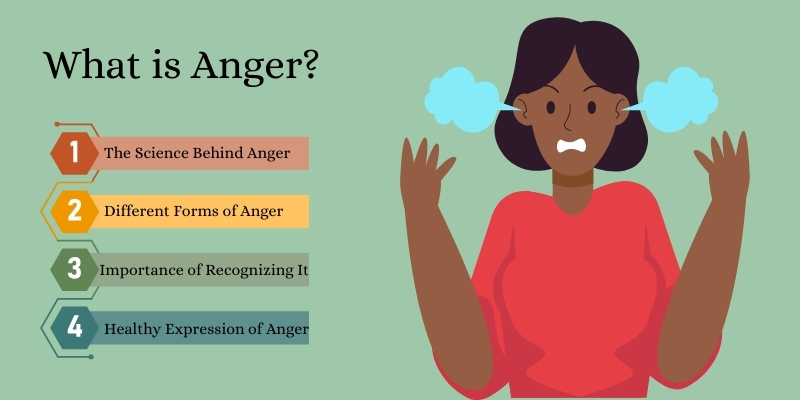
Anger is a natural emotional response to perceived threats, frustrations, or injustices. It is a basic human emotion, just like happiness or sadness, and serves as an alert system to let us know when something feels wrong or unfair.
While it’s often viewed negatively, anger itself is not inherently harmful—it’s how it is expressed or managed that determines its impact on individuals and those around them.
The Science Behind Anger
Anger activates the body’s “fight or flight” response, releasing stress hormones like adrenaline and cortisol. This physiological reaction increases heart rate, blood pressure, and energy levels, preparing the body to confront or escape a challenging situation.
However, if anger becomes chronic, it can lead to physical health problems like heart disease, insomnia, and weakened immunity.
Different Forms of Anger
Anger can manifest in several forms, ranging from mild irritation to intense rage.
It can be constructive, motivating people to address problems or injustices, or destructive when it leads to harmful behaviors such as yelling, aggression, or violence. Passive anger, such as silent resentment, can also strain relationships and mental health.
The Importance of Recognizing Anger
Understanding anger involves identifying its triggers, which can range from personal frustrations to external events. Recognizing early signs, like clenching fists, rapid breathing, or feeling tense, can help individuals address their emotions before they escalate.
Healthy Expression of Anger
Expressing anger in a controlled and constructive way is key to maintaining emotional well-being. This might involve communicating feelings calmly, seeking resolution rather than revenge, or channeling anger through physical activities like exercise.
Understanding anger is the first step to managing it effectively and avoiding the harmful consequences of unchecked emotions. By acknowledging its presence and learning to deal with it wisely, individuals can turn anger into a tool for growth and positive change.
What Is Wrath? Understanding Its Power and Impact

Wrath is often seen as an intensified and destructive form of anger. While anger can be a fleeting emotion tied to specific situations, wrath is deeply rooted, enduring, and often accompanied by a desire for revenge or harm.
Unlike anger, which can be constructive when managed well, wrath is almost always considered harmful due to its tendency to spiral into uncontrollable rage or vindictive actions.
The Characteristics of Wrath
Wrath is marked by its intensity and the way it consumes an individual. It is not just about feeling angry—it’s about being consumed by an overwhelming desire to right a perceived wrong, often through retaliation.
Wrath is rarely momentary; it tends to simmer and grow over time, leading to irrational thinking and extreme behavior.
The Psychological and Physical Impact
Wrath can take a significant toll on both mental and physical health. On a psychological level, it often feeds into feelings of resentment, bitterness, and hatred. Physically, it activates the body’s stress response, leading to increased blood pressure, heart rate, and tension.
Over time, unchecked wrath can contribute to chronic health issues like heart disease, headaches, and digestive problems.
The Consequences of Wrath
Unchecked wrath can destroy relationships, careers, and personal well-being. It blinds individuals to reason and often leads to actions they later regret.
Learning to recognize the signs of wrath and addressing its root causes is essential for preventing it from taking over your life. Managing wrath requires introspection, emotional regulation, and sometimes professional guidance.
The Core Differences Between Anger and Wrath
Although anger and wrath are often used interchangeably, they represent distinct emotional states with significant differences in intensity, duration, and impact.
| Aspect | Anger | Wrath |
| Definition | A natural emotional response to frustration, injustice, or perceived threats. | Intense, uncontrolled rage that often seeks vengeance or destruction. |
| Emotional Intensity | Can range from mild irritation to strong frustration. | Extremely intense, often leading to destructive thoughts or actions. |
| Duration | Usually temporary and subsides with time or resolution. | Can be long-lasting, sometimes turning into resentment or a desire for revenge. |
| Control Level | Can be managed and expressed in healthy ways. | Often uncontrollable and leads to impulsive or destructive behavior. |
| Expression | Can be expressed calmly through discussion or problem-solving. | Often explosive or suppressed until it erupts in harmful ways. |
| Effect on Relationships | If expressed constructively, it can improve understanding and resolve conflicts. | Damages relationships due to hostility, revenge-seeking, or prolonged resentment. |
| Psychological Impact | Can lead to stress, frustration, or momentary emotional discomfort. | May result in deep-seated hatred, bitterness, and long-term emotional distress. |
| Physical Impact | May cause temporary physical symptoms like increased heart rate and muscle tension. | Can lead to chronic health issues such as high blood pressure and cardiovascular problems. |
| Trigger Factors | Frustration, perceived injustice, unmet expectations. | Betrayal, deep resentment, long-term unresolved anger. |
| Moral or Ethical Component | Can be justified when responding to unfairness or wrongdoing. | Often associated with moral corruption, excessive punishment, or revenge. |
| Cultural and Religious View | Many cultures and religions view anger as a normal emotion that should be controlled. | Often considered a sin or a dangerous vice in religious and philosophical teachings. |
| Outcome | If managed well, it can lead to positive change and resolution. | Usually results in destruction, regret, or severe consequences. |
Understanding these differences is essential for managing emotions effectively and maintaining healthy relationships.
Intensity of Emotion
- Anger: Anger is a natural and temporary emotional response to a perceived threat or injustice. It can range from mild irritation to moderate frustration, and it often serves as a signal that something needs to change or be addressed. Anger, when managed properly, can even be constructive.
- Wrath: Wrath is an extreme and often overwhelming form of anger. It is marked by a deep-seated intensity that consumes the individual, pushing them toward irrational or even destructive behavior. Wrath often feels uncontrollable and is rarely proportional to the situation.
Duration and Nature
- Anger: Anger tends to be short-lived and situational. Once the issue causing the anger is resolved or addressed, the emotion usually dissipates. Anger is reactive and can serve as a momentary response to frustration or injustice.
- Wrath: Wrath, on the other hand, is enduring and often cumulative. It can simmer for days, months, or even years, fueled by feelings of resentment or a desire for revenge. Wrath rarely subsides on its own and may escalate without intervention.
Purpose and Outcome
- Anger: Anger can be a constructive force when channeled into problem-solving or communication. It signals a need for change and encourages action to resolve the underlying issue.
- Wrath: Wrath is destructive by nature. It is less about resolving a problem and more about unleashing pent-up rage, often with harmful consequences. Wrath is typically vindictive, seeking to harm others rather than achieve a resolution.
Control and Awareness
- Anger: Anger is usually manageable and allows room for self-awareness. People can recognize when they’re angry and take steps to calm down or address the problem.
- Wrath: Wrath often feels uncontrollable. The person experiencing wrath may lose the ability to think rationally, leading to impulsive and harmful actions.
Emotional and Social Impact
- Anger: When expressed appropriately, anger can strengthen relationships by encouraging honest communication. It allows individuals to set boundaries and advocate for their needs.
- Wrath: Wrath damages relationships and trust. Its intensity and vindictive nature can lead to broken bonds, regret, and long-term emotional fallout.
By understanding these core differences, individuals can work toward recognizing their emotions and managing them effectively, ensuring anger remains a healthy response and preventing it from escalating into wrath.
How to Effectively Manage Anger and Wrath: Proven Strategies
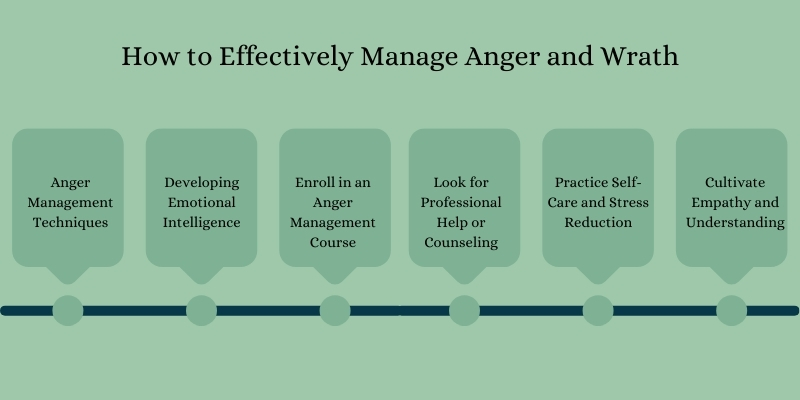
Managing anger and wrath requires intentional effort, emotional awareness, and the use of proven strategies.
While anger can often be resolved with straightforward techniques, wrath demands deeper introspection and long-term emotional growth.
1. Anger Management Techniques
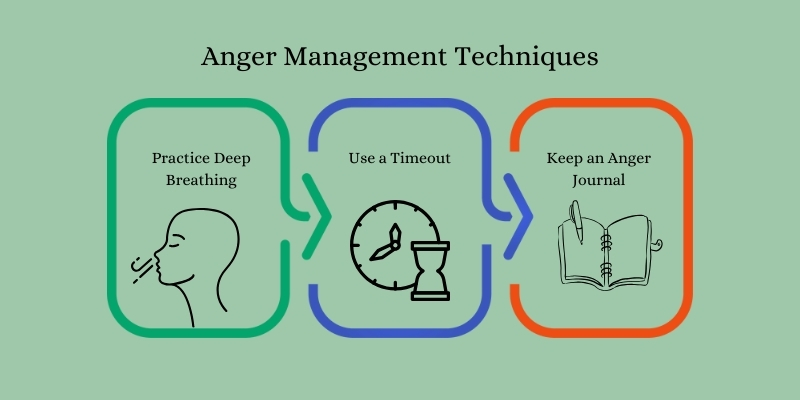
Managing anger starts with recognizing its triggers and using practical strategies to calm yourself before acting. Here’s how to do it effectively:
Practice Deep Breathing
- How to Do It: When you feel angry, pause and take slow, deep breaths. Inhale deeply through your nose for four seconds, hold for four seconds, and exhale slowly through your mouth. Repeat until you feel calmer.
- Benefit: Deep breathing helps regulate your body’s stress response, reducing the physical symptoms of anger such as a racing heart or muscle tension.
Use a Timeout
- How to Do It: Step away from the triggering situation for a few minutes. Find a quiet space where you can calm down and reflect before responding.
- Benefit: Timeouts prevent impulsive reactions and give you the space to think through your response rationally.
Keep an Anger Journal
- How to Do It: Write down situations that make you angry, including what triggered the anger and how you responded. Reflect on patterns and identify healthier ways to react.
Benefit: Journaling helps you become more aware of your triggers and provides insights for long-term improvements in managing anger.
2. Developing Emotional Intelligence
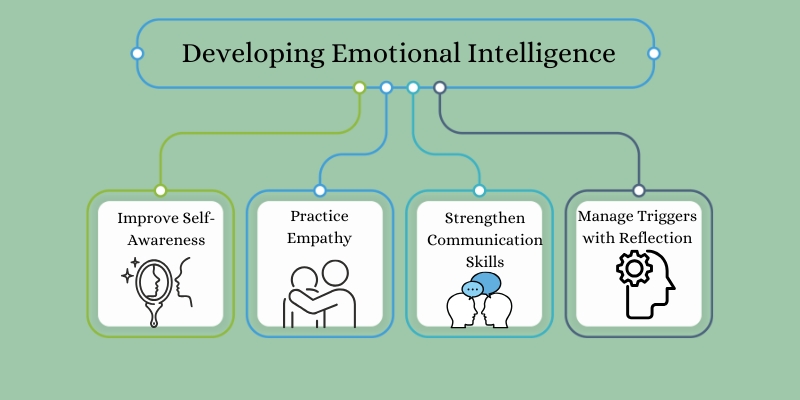
Emotional intelligence (EI) is the ability to understand and manage your emotions and recognize the emotions of others. It’s a vital skill for controlling both anger and wrath.
Improve Self-Awareness
- How to Do It: Pay attention to your emotional states throughout the day. Practice mindfulness by asking yourself, “What am I feeling right now?”
- Benefit: Greater self-awareness allows you to recognize the early signs of anger or wrath and address them before they escalate.
Practice Empathy
- How to Do It: Put yourself in the other person’s shoes during a conflict. Try to understand their perspective, even if you disagree.
- Benefit: Empathy fosters better communication and reduces the intensity of conflicts, making it easier to resolve disagreements.
Strengthen Communication Skills
- How to Do It: Use “I” statements to express your feelings instead of blaming others. For example, say, “I feel upset when plans change unexpectedly” instead of “You always ruin everything.”
- Benefit: Clear communication helps resolve conflicts constructively, preventing anger from turning into wrath.
Manage Triggers with Reflection
- How to Do It: Identify patterns in situations that provoke anger or wrath. Reflect on why these triggers affect you and how you can respond differently.
Benefit: Reducing the power of triggers helps you stay in control of your emotions, even in challenging situations.
3. Enroll in an Anger Management Course

Enrolling in a structured course on anger and emotion management can be a transformative step toward better control over anger and wrath.
These courses are designed to teach practical techniques, provide psychological insights, and help you understand your triggers and responses.
How to Do It
- Research Available Courses: Look for anger management classes in your area or online. These courses may range from short workshops to comprehensive programs lasting several weeks.
- Focus on Accreditation: Ensure the course is led by certified professionals with expertise in anger management or emotional regulation.
- Choose Based on Your Needs: Some courses are designed for specific groups, such as couples, professionals, or those experiencing severe emotional issues. Choose a course that aligns with your challenges.
Benefits
- Skill Development: Gain tools to calm yourself during moments of anger, communicate effectively, and navigate conflicts.
- Personal Growth: Courses often provide a safe environment to explore underlying issues like trauma or stress that contribute to anger.
Accountability: Being part of a structured program motivates you to practice the techniques you learn consistently.
4. Look for Professional Help or Counseling

Sometimes, the intensity of anger or wrath may require individualized attention from a professional.
Therapy or counseling can help you address deeper emotional issues, understand behavioral patterns, and develop long-term strategies for emotional control.
How to Do It
- Identify Your Needs: Determine whether you need help with managing anger in personal relationships, workplace conflicts, or past traumas.
- Find a Licensed Professional: Search for counselors or therapists specializing in anger management or emotional regulation like Dr. Carlos R. Todd. Verify their credentials and areas of expertise.
- Schedule a Consultation: Most professionals offer an initial consultation for anger assessment and determine if their selected approach is right for you.
- Commit to Regular Sessions: Consistency is key. Attend sessions regularly and practice the techniques provided by your counselor.
Benefits
- Personalized Guidance: Therapists tailor their approach to your unique triggers, challenges, and personality.
- Emotional Healing: Professional help often addresses the root causes of anger, such as unresolved grief, stress, or anxiety.
Improved Relationships: Couple counseling helps you communicate better, resolve conflicts, and rebuild trust with loved ones.
5. Practice Self-Care and Stress Reduction
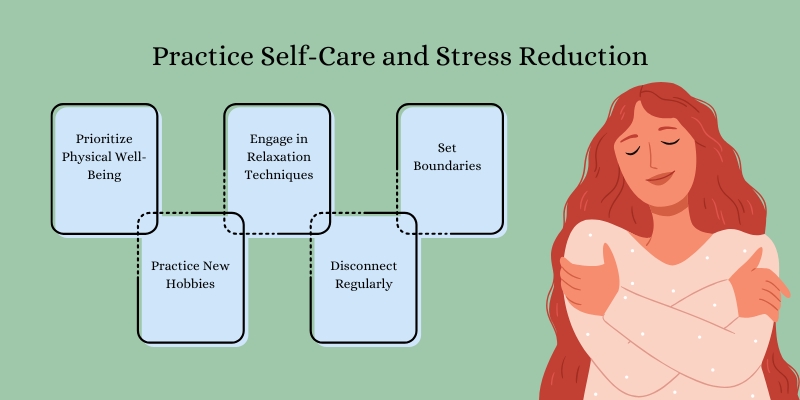
Taking care of yourself physically, emotionally, and mentally can significantly reduce the likelihood of anger and wrath spiraling out of control.
Stress is often a precursor to heightened emotions, and managing it through self-care can help you stay calm and composed.
How to Do It
- Prioritize Physical Well-Being: Regular exercise, a balanced diet, and sufficient sleep improve your body’s ability to handle stress and keep emotions in check.
- Engage in Relaxation Techniques: Practices like meditation, yoga, deep breathing exercises, or mindfulness help calm your mind and reduce stress hormones.
- Set Boundaries: Learn to say no to commitments that overwhelm you and dedicate time to recharge.
- Practice New Hobbies: Engage in activities you enjoy, such as reading, gardening, or painting, to help you relax and find joy outside of daily pressures.
- Disconnect Regularly: Take breaks from screens and social media to avoid overstimulation and comparisons that contribute to stress.
Benefits
- Improved Emotional Regulation: Reduced stress levels make it easier to process emotions rationally.
- Enhanced Resilience: Self-care builds your mental and emotional strength to face challenges.
Better Overall Health: Physical and mental wellness improves, reducing the physical symptoms associated with anger, such as headaches or high blood pressure.
6. Cultivate Empathy and Understanding
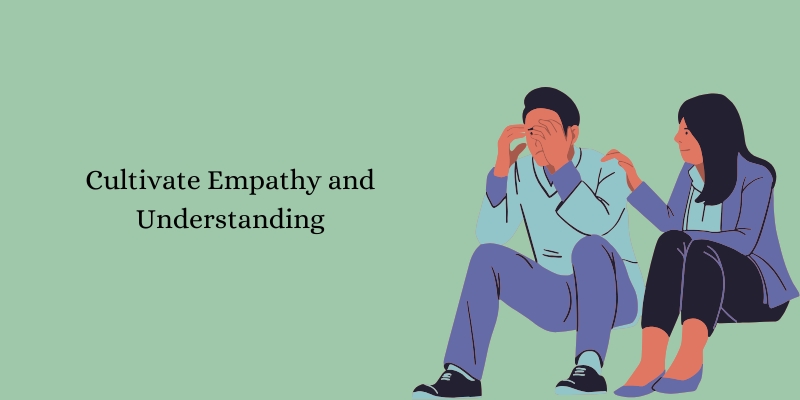
Empathy allows you to see situations from another person’s perspective, reducing the intensity of your anger and helping to prevent wrathful reactions.
Understanding others’ feelings fosters compassion and improves interpersonal relationships.
How to Do It
- Active Listening: Focus on understanding what others are saying instead of formulating a response while they speak. Acknowledge their emotions and validate their experiences.
- Put Yourself in Their Shoes: Practice imagining how the other person might feel or why they are reacting a certain way.
- Ask Questions: Seek clarification about their thoughts or feelings instead of making assumptions.
- Read About Emotional Experiences: Books, articles, or stories about diverse experiences can expand your perspective.
- Reflect on Your Actions: Regularly ask yourself how your words and behaviors might impact those around you.
Benefits
- Reduced Anger Triggers: Empathy helps you approach situations calmly, preventing misunderstandings that could lead to anger or wrath.
- Stronger Relationships: Understanding others’ perspectives fosters deeper connections and mutual respect.
- Conflict Resolution: Empathy enhances your ability to work through disagreements constructively and find common ground.
By practicing anger management exercises, you create a more balanced, peaceful life and healthier relationships. These strategies not only help you manage anger issues but also contribute to long-term emotional well-being.
Frequently Asked Questions
Is wrath always a negative emotion?
Wrath is generally viewed as a destructive emotion because it often involves uncontrolled rage and a desire for revenge, leading to harm.
In rare cases, it can inspire action against injustice when channeled constructively, but this requires careful self-awareness.
What are the psychological effects of anger and wrath?
Both anger and wrath can trigger stress, anxiety, and feelings of frustration. Long-term exposure to these emotions may lead to mental health issues such as depression, burnout, and difficulty managing stress, while also impairing emotional regulation.
How do anger and wrath impact relationships and communication?
Anger can cause misunderstandings and temporary conflicts, but wrath often results in severe breakdowns in trust, aggressive communication, and long-lasting damage to relationships. Both can negatively affect effective communication if not managed properly.
What are some real-life examples of anger versus wrath?
Anger might occur when someone cuts you off in traffic, causing momentary frustration. Wrath, however, could involve road rage, where the frustration escalates into aggressive actions like tailgating or confrontation, driven by a loss of control.
Conclusion
Understanding the distinction between wrath vs anger is crucial for managing these emotions effectively and maintaining healthy relationships.
While anger is a natural response to frustration or perceived injustice, it can often be resolved through healthy communication and self-awareness.
Wrath, on the other hand, is a more intense and destructive form of anger that can lead to harmful actions if left unchecked.
Recognizing the difference allows individuals to address the root causes of their emotions and take steps toward positive change.
Managing both anger and wrath requires commitment and practical strategies, such as practicing self-care, developing emotional intelligence, and seeking professional guidance.
By focusing on these methods, you can transform negative emotions into opportunities for growth and self-improvement.
It’s also important to remember that learning to channel anger constructively can strengthen your relationships, enhance your communication skills, and reduce the emotional toll on your mental and physical health.
If you find it challenging to manage these emotions on your own, don’t hesitate to reach out for help. Professional counseling or anger management programs can provide the tools and support you need to gain control and lead a more balanced life.
By addressing anger and wrath with a proactive approach, you can cultivate inner peace and create a more positive environment for yourself and those around you.


2 Responses